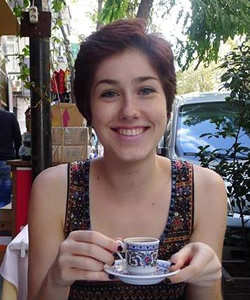When I first arrived in Russia, I was naive—a good little SFS student with dreams of becoming a diplomat and changing the world. I believed in the higher goals of American foreign policy: the fight for democracy and human rights, the integrity and goodwill of the international market economy, and the international system as a whole. I felt proud to be the citizen of a country that was fighting to spread liberal ideals and generally make the world a better place.
I have always prided myself on my cultural openness, and have always looked with distaste at those whom I viewed as close-minded, biased, and hypocritical. Looking back at my former self, however, I see that this was little better than a delusion. I see now the implicit bias with which I approached interactions with Russians. Of the way that I would shake my head ironically while watching the Russian news, or how I would listen to attacks made on Western policies with a grimace—hardly succeeding at concealing my awe at what seemed to be obvious backward propaganda and clear brainwashing. “You prefer authoritarianism to democracy?” I would ask my Russian friends. “You think that human rights should be limited? You approve of Putin’s politics? Oh, you poor things. You just don’t understand.”
In a word, I had mistaken pity for understanding. And the thing about pity is that it puts us above those who are the objects of our pity. We are the lucky ones who understand the world the way that it truly is, and they are the poor ones left behind, the ones that need a helping hand to reach the glory of our heights.
Over time, my mindset started to change. I began to see the news not as an eternal dichotomy of “truth” vs. “propaganda” along the ghost of the iron curtain, but rather as an informational war, to which both sides added valid points and had clear internal biases. I began to see Russia’s logic, and its development in parallel to Western logic, and that both were, from a certain perspective, valid and sound. I began to see that Russia was right in some things that we were wrong, and vice versa. And, bit by bit, I could see that I was the one in need of de-brainwashing—not them.
In America, we seem to think that we have a monopoly on truth. This, I think, is because every day we see a polarization of views—MSNBC vs. FOX, left vs. right, the steady polarized bickerings (and worse) of Democrats and Republicans that flood our news and pull us under the delusion that, between the two opposite extremes of press that emerge out of our political system, we have access to the full spectrum of existing opinion on any given issue. While on the domestic front this might be more or less true, the whole system fails regarding international news and US foreign policy. Sure, we still argue about the use of force in some situations, we still feel a conservative/liberal divide on certain foreign aid and military issues—but the basic essence of the perspectives that we are fed in the news is the same, tending to follow the status quo of government policy. We take for granted words like “revolutionary,” “terrorist,” “legitimate,” “legal"—largely trusting in what we are told without a second thought. We don’t look deeper, perhaps because we don’t want to see.
If my time in Russia has taught me anything, it is that our news, our foreign politics, our American people are just as biased as the Russians in our own way. We are trapped in a self-reinforcing bubble of misunderstanding and prejudice that is slowly suffocating us and discrediting us abroad. If we truly want to be leaders for good in the international arena, then we must first take a hard look at ourselves, and at the way that we approach the world. And, most importantly, we must first be open to the idea—the hardest of all—that we may be wrong.

